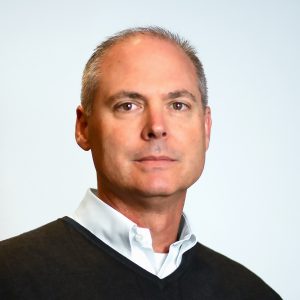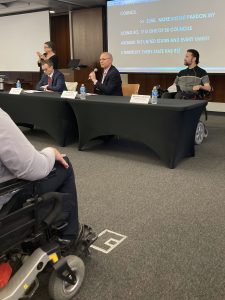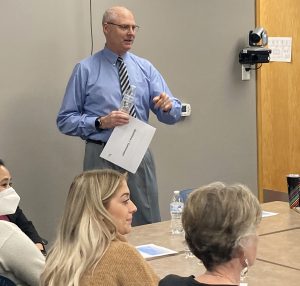Fairness First blog
The Fairness First blog represents a space where researchers share with the broader community why health equity research matters to them, how do they connect to health equity, and what is the value of community engagement in the research process.
April 30, 2023
Advocating for Arizonans with intellectual and developmental disabilities, with Jon Meyers
 Jon Meyers is a member of the Community Expert Board for the Southwest Health Equity Research Collaborative (SHERC) at Northern Arizona University.
Jon Meyers is a member of the Community Expert Board for the Southwest Health Equity Research Collaborative (SHERC) at Northern Arizona University.
Jon became executive director of the Arizona Developmental Disabilities Planning Council in March 2022, after serving as executive director of The Arc of Arizona since 2013.
In his current role he oversees advocacy, public policy, and grantmaking programs to promote greater inclusion and opportunity for Arizonans with intellectual and developmental disabilities. Jon’s background in the non-profit sector spans more than 35 years and ranges from the arts and education to social services and animal welfare.
Through his career he has held executive and development positions with, among others: The Leukemia & Lymphoma Society; Arizona State University/ASU Foundation; Thunderbird School of Global Management; and Ronald McDonald House Charities. He began his professional career in the External Relations office at NASA Ames Research Centers.
He began his professional career in the External Relations office at NASA Ames Research Center in Mountain View, California. Jon is a graduate of Santa Clara University with degrees in theater arts and history. He and his wife live in Phoenix, Arizona. They have three grown sons.
Q. How do you define “health equity” or “health fairness” based on the work you do within your role as executive director of the Arizona Developmental Disabilities Planning Council?
A. Historically, the disability community has been among the most marginalized and disempowered in American society. And where disability crosses with other areas of marginalization*—whether race or ethnicity, language, gender, geographic isolation, you name it—the situation is typically even worse.
Health equity, like every form of equity**, involves providing all individuals with the resources they need to be successful and as healthy as possible−but, importantly, in a way that is appropriate to their circumstances, their physical and cognitive needs, and their culture. That’s often quite difficult to achieve in the best of situations, even when a disability isn’t involved. Yet, it’s what every human being deserves, regardless of ability or disability.
For my organization health equity, important as it is on its own, is a component of an even larger effort. Health equity is an extension of our overarching quest for equity in every area of life. Unfortunately, true health equity is still an aspiration for the community of people with intellectual and developmental disabilities, or I/DD. We’ve come a long way, but we still have a very long way to go.
* Marginalization describes when a person or group is treated as unimportant and pushed aside to the margins or edges of society.
** Equity is a term referring to the quality of being fair or just.

Q. What motivated you to pursue the work you are now doing?
A. To be completely honest, I landed in disability advocacy by accident. My college degree is in theater, so I basically prepared to be absolutely useless in the real world. I had decades of experience in non-profit organizations, but no prior background in the disability field before being hired by The Arc of Arizona in 2013. I was just looking for a new opportunity.
Perhaps, because of my prior employment which included a lot of human services-related work, it didn’t take long for me to feel a strong connection to this community and this field. It holds the potential for both great satisfaction (as when we achieve a victory that improves the circumstances of people with I/DD) and, on occasion, great disappointment (when we encounter a situational* or systemic barrier** that seems impossible to overcome).
In spite of the challenges, though, it’s impossible not to be hopeful about what the future holds. Looking at the progress made in the past century because of passionate self-advocates and advocates, there’s no doubt more good will come. As frustrating as it might be—and it really is frustrating sometimes—we just have to accept the step-by-step, changing nature of the work.
* Situational barriers are obstacles that arise due to an individual’s life situation, such as financial constraints, family needs, time pressures, etc.
** Systemic barriers are obstacles in the form of policies, practices, or procedures that result in some people being unfairly discriminated against or prevented from accessing services and resources they need to support their wellbeing.
Q. Our communities are made up of different sectors that can influence the health of community members, which can include transportation, education, government, housing, food and agriculture, health and human services–to name a few. What sector(s) of the community do you represent in the work you do, and how does this sector (or sectors) influence health outcomes for the community?
A. Being focused on public policy and advocacy on behalf of people with I/DD, my work tends to involve a wide expanse of topics and issues—everything from healthcare to housing, transportation, employment, education, self-determination, safety, caregiving, and much, much more.
Looking through the Social Determinants of Health lens, there isn’t a single one of these sectors that doesn’t somehow contribute to the health and well-being of the people my organization serves. Every one of them makes an important contribution to overall health and each has to be considered a component of health equity.
Where disparities* or inequalities exist (and they exist to some degree in all the sectors mentioned above), we have a responsibility to: 1) bring them to light, 2) address the causes and remedies, and 3) offer whatever we can toward carrying out solutions.
* Disparities are inequalities or gaps. For example – health disparities are inequalities or unfair differences in health among different groups of people.
Q. What are some specific health inequities or examples of health injustices that surround your work in advocating for people with intellectual and developmental disabilities (or, I/DD)?
A. Along with a number of partnering organizations, ADDPC has invested significant time and effort over the past few years increasing awareness of the need for improved behavioral health and crisis services for people with autism, Down syndrome, and a multitude of other I/DD diagnoses.
Arizona’s crisis responders and its entire crisis response system are poorly equipped to serve individuals with cognitive disabilities in crisis situations. As a result, a number of recent interactions between people with I/DD and crisis responders (which too often include law enforcement personnel who aren’t properly trained to de-escalate when someone with I/DD is involved) have resulted in truly unfortunate outcomes. No one wants such things to happen and everyone wants the system to improve.
In early 2022, ADDPC published a lengthy report addressing the shortcomings of the current system and offering recommendations to make it better. Since that time, we have worked closely with a variety of state and local agencies, as well as other advocacy organizations, to expand training opportunities for responders and implement the recommended improvements. That work will continue so long as the need persists.
Q. How do you want your work to make a difference or change in this world?
A. It’s pretty simple: I’d like my work to contribute to creating a state and larger society that is more inclusive, more welcoming, and more respectful toward individuals with intellectual and developmental disabilities. In the short term, I intend to continue working on policy changes and advocacy that result in better opportunities and supports for the I/DD community.
Over the longer term, I am optimistic we can truly change attitudes and perceptions, that we can evolve our cities and town and neighborhoods to offer every resident the greatest possible chance to thrive. That means, going back to the notion of equity, that we have to take it as our charge to provide the proper resources in the proper way to those who aren’t “typical.” It won’t be easy and it will take time, but I’m up for it.
That being said, this work is massive. I’m fully aware that my contribution is quite tiny in the overall scheme. But the number of people engaged in the work continues to grow, and together we have the power to do great things.

Q. What is one important lesson you’ve learned about yourself and this region through your work?
A. I’ve learned a million different lessons doing this work! Maybe the thing that sticks with me most about the region is that people can surprise you in the most amazing ways. Be careful of the negative assumptions you make, because you just might be proven horribly wrong.
Disabilities don’t only affect people of one political party or social class or ethnicity; they can affect anyone at any time. So anyone and everyone can have an interest in addressing the challenges associated with disabilities. And when you look at the coalitions that get built in Arizona to do just that, in their astonishing diversity, you see that borne out.
As for myself, I’ve certainly learned how much more there always is to learn. Many of the people with whom I work have probably forgotten more about the disability field than I will ever know. I’m nowhere near perfect at it, but the adage “you have two ears and one mouth—use them in that proportion” often comes to mind.
Q. Self-care is a vital part of our collective work towards health fairness for all (or, health equity). What is one thing you do to make sure you are caring for yourself—emotionally, mentally, physically, or spiritually?
A. There are actually two answers to this. First (and kind of boring), I am trying to establish some boundaries around work and to protect more time to be with family. That’s kind of new and refreshing. But second, I’m a big fan of laughter, even at my own expense, which I find to be an enormous source of self-care. Our work should be taken seriously, of course, but we—or perhaps I should just say, I—need to be very careful to not take ourselves too seriously.
So I appreciate every opportunity for humor in the workplace and at home. It can be such a release, as well as a really effective tool for communicating. I try to incorporate it into presentations, staff meetings, interactions with family and friends, wherever it’s appropriate. And I appreciate being made to laugh by others. Humor isn’t right for every situation. I’m convinced, though, that the more opportunities we find to let out a chuckle or a belly laugh, the healthier we all will be.
Back to the main Fairness First Campaign page.
